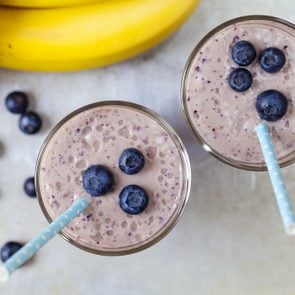If You’re Over 65, You’re Almost Definitely Low in 2 Key Vitamins
Updated: Dec. 21, 2022
An alarming number of seniors are walking around with low levels of super-important vitamins. Here's what you need to know.
If you’re 65 or older and feeling a bit blue, it could be because you’re running low on key vitamins for seniors; specifically, vitamins D and B12. In a study, published in the journal Nutrients, researchers set out to understand the impact of environmental factors, lifestyle, and genes on health. When they reviewed 1,000 blood samples taken from participants ages 65 to 93, they found that more than half the seniors were not getting enough vitamin D. One in four also had a vitamin B12 deficiency.
They weren’t entirely surprised. The physiological changes that come with aging can impact the nutritional needs of older adults. As a result, older adults may be at increased risk for specific micronutrient deficiencies unless they tweak their diet.
How to get more vitamin D and B12
The body makes vitamin D when sunlight hits your skin. Most people meet at least some of their vitamin D needs this way, according to the National Institutes of Health. Among the foods naturally high in vitamin B12: salmon, liver, clams and dairy products.
“Older adults are prone to a vitamin D deficiency due to changes in their skin’s ability to convert this vitamin into the active form used by the body,” says Steven Starks, MD, a geriatric psychiatrist and clinical assistant professor at the University of Houston College of Medicine. “Seniors are more likely to develop a vitamin B12 deficiency because their stomachs produce less acid. It’s the acidity that helps our bodies absorb this vitamin.”
Thinking About Popping a Vitamin D? Read This First
 When to see a doctor
When to see a doctor
These are crucial vitamins for seniors: Low levels of vitamin D can lead to health problems including bone and muscle pain, high blood pressure and depression. A B12 deficiency can cause tiredness, weakness, constipation, loss of appetite, weight loss and anemia.
“Doctors will typically check your levels if there’s an identifiable change in your health, ” says Dr. Starks. “A change in your memory or thinking, and differences in your mood—depressed, low, or sad moods—may lead your doctor to check your vitamin D levels. Unusual sensations, numbness or tingling, a difference in your gait, fatigue, and memory problems may lead them to check your B12 levels.”
If you’re deficient, your doctor may recommend you take vitamins as a dietary supplement, he adds.
- The Most Heart Attacks Happen This One Day of the Year—Doctors’ Tips to Prevent ‘Holiday Heart’
- Don’t Smoke? Here’s Why You Still Need to Be Screened for Lung Cancer
- This Type of Exercise Can Reduce the Risk of Cancer Spreading, Research States
- Why Does Money Cause Anxiety? 5 Finance Habits to Transform Your Peace of Mind


